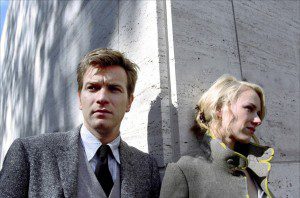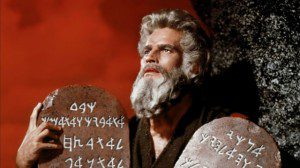 On the face of it, you might think Elizabeth: The Golden Age would not have to deal with the same sorts of problems that plague other sequels. While the creators of fictitious franchises have to walk a fine line between recycling their earlier movies and offering something new, the Elizabeth movies are supposed to be based on history, and you might think that each film, by focusing on a different part of the reign of the original Queen Elizabeth, would be somewhat unique. But alas, that is not how it turns out. Yes, The Golden Age has a sea battle and one or two other new bits, thanks to its presumably bigger budget. But for the most part, it plays like a pale retread of the film that earned Cate Blanchett her first Oscar nomination nine years ago.
On the face of it, you might think Elizabeth: The Golden Age would not have to deal with the same sorts of problems that plague other sequels. While the creators of fictitious franchises have to walk a fine line between recycling their earlier movies and offering something new, the Elizabeth movies are supposed to be based on history, and you might think that each film, by focusing on a different part of the reign of the original Queen Elizabeth, would be somewhat unique. But alas, that is not how it turns out. Yes, The Golden Age has a sea battle and one or two other new bits, thanks to its presumably bigger budget. But for the most part, it plays like a pale retread of the film that earned Cate Blanchett her first Oscar nomination nine years ago.
Once again, Elizabeth is beset by suitors and advisors who tell her that she needs to marry and produce an heir if she is to secure the throne; however, since the film begins in 1585, when Elizabeth was 52 years old, it is doubtful whether it would even be possible for her to have a child. (Blanchett is 38, but she plays the character — who worries about the toll that time is taking on her body — as though she were older.) So when the suitors do show up — some of them sending only their portraits, which Elizabeth studies with a magnifying glass — they are played for laughs. The sense of urgency that marked Elizabeth’s courtships in the earlier film is gone.
And once again, Elizabeth has to deal with conspirators and would-be assassins — all of them Catholic, some of them Spanish, and one of them a woman with ties to the Scottish and the French. But for some reason the conspiracies are less interesting this time, too. Perhaps it is because Mary Stuart (Samantha Morton), the Queen of Scots, is holed up in a castle almost every time we see her, with little or nothing to do except write self-incriminating letters. Perhaps it is because Rhys Ifans, as a psycho killer known only as “the Jesuit,” is already beginning to seem like a typecast cliché when he is cast in these sorts of roles (in his last film, Hannibal Rising, he introduced the young Hannibal Lecter to the fine art of cannibalism).
Or perhaps the villains seem so tepid now because the forces loyal to Elizabeth have also been watered down. Chief among these is Sir Francis Walsingham (Geoffrey Rush), the spymaster who was introduced in the earlier film as a murderous, agnostic and sexually ambiguous figure who enjoyed manipulating the political scene behind Elizabeth’s back, but who is now portrayed as a quasi-sympathetic family man who, on one occasion, is slapped by Elizabeth and thus put back in his place. Yes, he still tortures conspirators, but he doesn’t relish it the way he used to.
Part of the twisted genius of the earlier film was the way it treated the royal families as rival gangs, almost rival mafia families, right down to a climactic montage that was pretty much ripped off from The Godfather. But the new film isn’t interested in making Elizabeth’s men look as “bad” as their opponents. Instead, it harps on the idea that Elizabeth and her country stand for freedom, including the freedom to follow whatever religion you like — which, historically, wasn’t true. As Victor Morton has put it, every Catholic child in England knows what a “priest hole” was.
The new film also follows a template that seems to owe a fair bit to The Lord of the Rings (in which Blanchett played the elf-queen Galadriel). The Spanish King Philip II (Jordi Mollà, taking over for the first film’s George Yiasoumi) says he is “sacrificing Spain’s forests” to build his mighty armada — echoes of Saruman tearing down the trees around Isengard, perhaps? And when the Spanish ships appear on the horizon, the watchmen light towers on mountain peaks across the country, just as we saw them do in Gondor. And it all leads to Elizabeth clad in solid armor and riding a horse and rallying her troops, just like Aragorn did.
Somewhere in all this, Elizabeth finds time to become embroiled in a sort of love triangle with Sir Walter Raleigh (Clive Owen), an explorer who has just returned with potatoes and tobacco leaves from an American colony that he named “Virginia” in honor of the Virgin Queen, and her lady-in-waiting, Elizabeth “Bess” Throckmorton (Abbie Cornish). Elizabeth is too firmly ensconced in her throne, and too conscious of her duty, to pursue her relationship with Raleigh very far — but this does not prevent her from lashing out when she hears of his involvement with Bess, in a scene that seriously robs the character of her dignity, both as a royal and as a person.
Showing the “real woman” behind the icon is, of course, partly what director Shekhar Kapur and screenwriters William Nicholson (Shadowlands, Gladiator) and Michael Hirst (TV’s The Tudors) are trying to do here. But do we really get a sense of who Elizabeth was? The previous film’s fictionalizations could be excused, to some degree, because it was making a thematically provocative point or two. But The Golden Age recycles much of the same basic material without offering any real insight into the woman or the times in which she lived. And where the previous film drew our attention to the way religious sentiments are manipulated for political purposes, the new film ultimately plays like an old-fashioned propaganda movie, in which the breath of God ensures that “our” side wins and the other side loses.
2 stars (out of 4)
–
Talk About It
Discussion starters
1. “Fear” is a recurring theme in this film. Which characters feel it? How do they deal with it? What is the film trying to say about “fear” in this day and age?
2. What does the film say about divine involvement in human affairs? Note how the Spanish king speaks of “miracles,” and how Elizabeth hopes for “the impossible.”
3. Does the film imply that God took a side in the battle between Spain and England? Do you think God ever prefers one side over the other when nations go to war, in these post-biblical times? If so, what part do human actions play?
4. Elizabeth says she will not be pushed around by the Fates; does the film indicate that she was successful in this, or was her success itself fated?
The Family Corner
For parents to consider
Elizabeth: The Golden Age is rated PG-13 for violence (a naval battle, a knife is pushed down a man’s mouth, spikes pierce the skin of a man kept in a cage), some sexuality (a man unlaces a woman’s blouse in bed) and nudity (we glimpse a naked woman from behind as she studies herself in a mirror). The villains are relentlessly portrayed as fanatical Catholics, and Elizabeth also consults an astrologer.
— A version of this review was first published at Christianity Today Movies.












